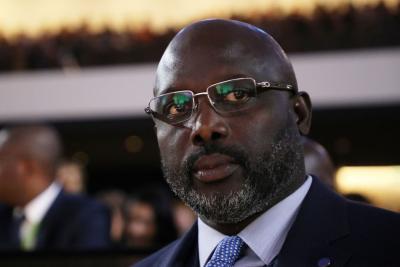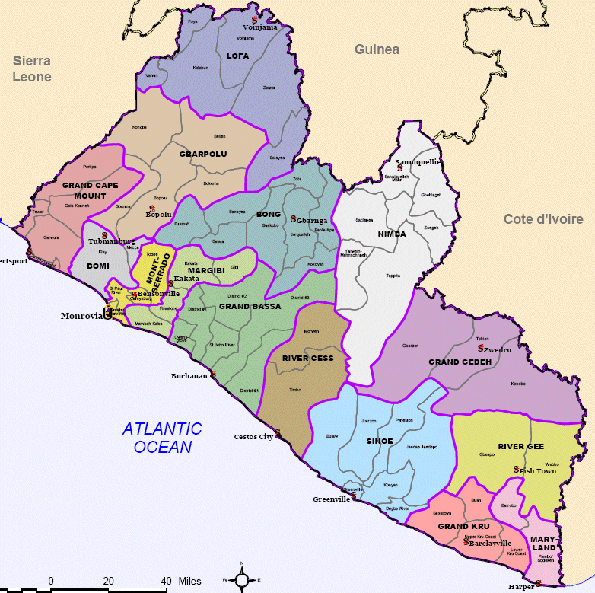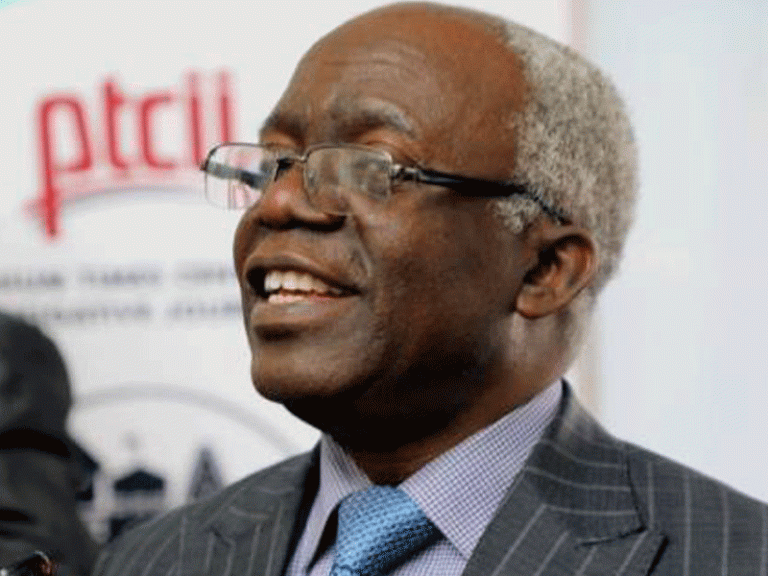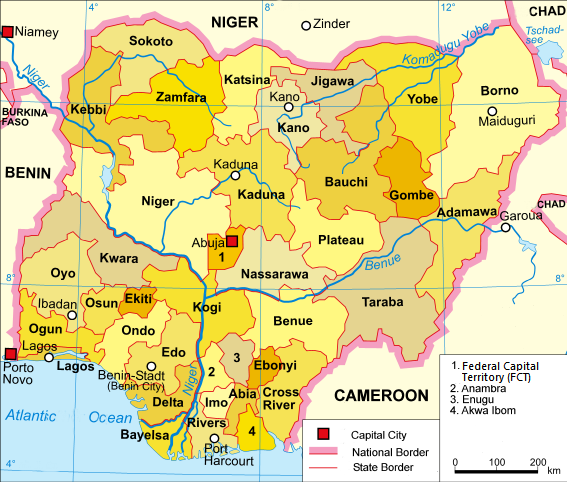Yesterday’s post included an article published in one of Liberia’s main newspapers, the Daily Observer, on the current wave of killings and disappearances in Liberia and the urgent need for the police te act. Today, I wish to draw your attention to an editorial in another, equally important newspaper, Front Page Africa, founded, owned and edited by the famous Rodney Sieh.
The title of the Op-Ed speaks for itself, ‘Enough enough’. The editorial starts with an impressive list of nearly 20 victims: murdered, disappeared, mutilated, the victims have in common a cruel and premature end of their life. The author, Milton Nathaniel Barnes, criticizes the inaction of the government, the absence of the rule of law, and the persistence of impunity.
Mr.Barnes’ cry is echoed by an article in the Daily Observer of today, November10: ‘Silence Is Not An Option, Mr. President!’
Already in mid-September, the Daily Observer had published an editorial entitled “The People of Liberia Are Under Siege – Break That Siege Now”, pointing out that rising insecurity had become an issue affecting all Liberians. The newspaper editor criticizes President George Weah and concludes with a pertinent statement: ‘(….) President Weah must break his silence, speak to the Liberian people and reassure them. For, anything short of this would suggest complicity. Silence is not an option Mr. President!‘
Will President Weah understand the message and act accordingly?
We’ll see the coming days.
I will report on subsequent developments (webmaster FVDK).
Liberia: Enough Is Enough – Too Many Murders Going With Impunity

Published: November 8, 2021
By: Milton Nathaniel Barnes – Front Page Africa, Liberia
Follows a list of recent victims:
Rev. Dr. William R. Tolbert III (November 1, 2021)
Maude Elliot (October 31, 2021)
John H. Tubman (September 22, 2021)
Unidentified Woman on 17th Street Beach (September 14, 2021)
Matthew J. Innis (August 2019)
Mordecai Nyemah (May 2021)
Melvin Earley (February 19, 2021)
Florence Massaquoi (February 2021)
Robert M. Blamo, Jr. (2021)
Bobby S. Gbeanquoi (2021)
Siafa G. Boimah (2021)
Albert Peters (October 2020)
Gifty Lama (October 2020)
Elijah Polumah (2020)
Abraham Tumay (2020)
George B. Fanbutu (2020)
Possibly, others unknown
WHAT’S GOING ON, MY PEOPLE? In every instance above, innocent lives have been taken; and, we are not sure what is being done about it. Liberians are dying mysteriously or being brutally murdered. Murderers are getting away with impunity. The usual lip service is paid; the family greaves; and, we carry on our lives disillusioned and frightened.
WHAT IS EXASPERATING about this is that Liberians are fearing for their lives in the midst of dire poverty and economic straits. They barely eke out a living encountering the huge cost of feeding themselves, educating their children, paying their rent, transporting themselves, only to be faced with the threat of someone murdering them in cold blood.
WHY ARE LIBERIANS continuing to face these nearly insurmountable challenges? Simply stated, this is due to the absence of Law and Order, which should, at the very least, investigate and inform the public so as to reassure them that authorities are responding with urgency. In this particular environment, when criminals believe that they can get away with heinous acts including brutal murders, they take that as a “license to kill” in view of the fact that there appear to be no consequences.
IN MY OPINION, this comes down to the matter of leadership. For quite a while now, Liberia has been led by politicians as opposed to authentic leaders. Basically, what I’m saying is that there is a distinct difference between a leader and a politician. An authentic and effective leader will address numerous challenges, be they economic (fiscal-monetary management, unemployment, etc.) or social (justice, education, healthcare etc.), using a wide array of tools. A leader knows how to corral the appropriate experts who can provide effective solutions to whatever challenges may arise within his or her sphere of influence.
A POLITICIAN, on the other hand, possesses a singular tool that is used to address any and every issue: politics. From the politician’s perspective, every problem, regardless of its nature, requires the solution of political rhetoric. The politician says whatever he or she believes will assuage the people. The goal is to persuade the people that things will be fine. Saying so, as we all know, does not make things so. Yet, the only tool of the politician is politics (i.e. the power of persuasion).
IN THE FACE OF MURDERS with impunity, leaders, at all levels of society, cannot afford to sit aside with indifference. We must stand up against these outrageous acts. We know that God is the ultimate judge; yet, every true religion teaches us that there are laws by which we must govern ourselves. In Liberia, our entire social fabric is at risk of disintegrating. No society, without a modicum of justice in the face of serious crime, can continue to function. It will inevitably tumble into utter chaos.
IN VIEW OF WHAT IS UNFOLDING, I am poised to ask the following questions:
Can we, as a country and people, take decisive steps to address these concerns?
Can we source international support to investigate these deaths many of which seem mysterious; if, and only if, we lack the resources and technical ability to do so?
Can the public be kept abreast as to the progress Government is making in investigating these deaths?
CAN WE ALSO ENDEAVOR to investigate the drivers of these mysterious killings?
Lest we forget, regardless of the circumstances of these deaths, whether politically motivated and or based on hatred, they do have ripple effects that transcend the actual victims. We may have to deal with how family members are affected and what interpretation others connected to the victims may conceive.
REMEMBER, the fruit of peace and freedom is priceless; and living in the spirit of fear breeds distress.
THIS IS A CLARION call to all people of Liberia to stand up and put an end to brutal murders and other serious crimes. Our first step is to unilaterally and publicly condemn these atrocious acts; and, then, demand that our justice system fully and completely investigates each unexplained death. Culprits must be prosecuted and punished to the full extent of the law.
IN TIMES OF TROUBLE, when good people sit aside supinely and do nothing, they are no better than the perpetrators of evil; for there is an adage that says, “we give acquiescence by our silence.”
Source: Liberia: Enough Is Enough – Too Many Murders Going With Impunity
Silence Is Not An Option, Mr. President!

Published: November 10, 2021
By: Editorial Board – Daily Observer, Liberia
Barely two months ago in its September 16, 2021 editorial headlined – “The People of Liberia Are Under Siege – Break That Siege Now”, the Daily Observer pointed out that rising insecurity had become an issue of grave concern to Liberians across the board.
Note of the webmaster: This article by the Daily Observer’s Editorial Board has been included below – italics are mine, FVDK).
There have been persistent media reports of unexplained disappearances as in the case of the Blamo brothers who were reportedly hired by the proprietor of the St. Moses Funeral Parlors and extrajudicial killings including ritualistic killings carried out by individuals with alleged links to this government.
We recall the deaths last year of the Liberia Revenue Authority (LRA) government auditors under mysterious circumstances. President Weah’s comments, suggesting that Gifty Lama and her colleague who were found dead in a vehicle on Broad Street were both lovers making out in their car, sent a wave of shock through the public.
Another LRA official, while driving along the SKD Boulevard, was attacked by machete wielding motorcyclists, causing him to run off the road and crash into a nearby house.
In yet another instance, the head of the Internal Audit Agency was killed after allegedly falling from the balcony of his house on SKD Boulevard.
President Weah’s response to that development was to urge citizens to install close-circuit television (CCTV) cameras around their homes. That was well before the spike in reports of ritualistic killings around the country, which has served to create a climate of fear and uncertainty amongst the citizenry.
It is safe to say that Police response to such reports of extrajudicial killings have been at best ineffectual. Police Inspector-General Patrick Sudue, responding to expressed public concerns about the rise in ritualistic killings, dismissed such reports, adding that Liberians are freely disposing of their dead in the streets because of their inability to give their relatives a decent burial.
He further declared that it was against such a backdrop that reports of bodies being discovered with parts missing were all fake news, intended to discredit the Weah administration.
But as events have shown, the fears of the people appear justified, given the spate of recent brutal murders of John Hilary Tubman, son of the late President William V.S. Tubman; William Richard Tolbert III, son of the late President William Richard Tolbert, Jr; and former immigration officer, Maude Elliot, in their respective homes.
Those tragic events, all unfolding within a very short period, have again raised public concerns about what they see as no end to the growing wave of insecurity under this government.
Not a single perpetrator has been apprehended in all of the cases cited earlier. This is giving rise to a heightened sense of insecurity. After dark, the streets of Monrovia become virtually deserted.
By 10pm latest, all stores, shops and supermarkets are shut and business comes to a grinding halt, except for a few night clubs which remain open until midnight.
Only recently, in broad daylight, a group of armed thugs invaded a restaurant and bar located on 19th Street near the beach, shaking down bartenders and customers alike, taking away their valuables and money.
To the best of public knowledge, no suspects have, as yet, been apprehended by the Police. The Police, as is well known, is hamstrung in the effective discharge of its duties and responsibilities by the critical lack of logistics including communications.
However, concerns about corruption remain an abiding concern. Salaries are low, discipline poor, and effective leadership is lacking. Under the leadership of current Police Inspector-General Patrick Sudue, public confidence in the Police has waned significantly to the point where the Police is now being seen as partisan.
This negative public impression of the Police persists despite pronouncements by a local civil society group, National Youth Movement for Transparent Elections (NAYMOTE) declaring that public confidence in the Police is increasing.
Given the current outlook, it appears that the restoration of public confidence in the Police is still a long way off. The disconnect between the Police and the public appears to be widening instead.
Official government support to the Police rather than being directed at countering public dissent and clamping down on freedom of speech and assembly should instead be increased to aid its effectiveness and ability to provide protection to the people of Liberia.
This newspaper once again reminds President Weah that there is a climate of fear being created by such gruesome and mysterious killings as well as unexplained disappearances. The Daily Observer has consistently reminded this government that the creation of a climate of fear is in no one’s interest.
This is because of the recognized fact that a climate of fear also induces feelings of hate and ill-will towards the government. Such feelings can be suppressed but only for a time. They simmer and without warning can explode like a volcano with dastardly implications for social cohesion, national stability and security.
Accordingly, it behooves all — the public and government alike — to work in tandem to curb the rise in violent crime and politically motivated murders such as ritualistic killings.
Above all, it bespeaks the urgent need to end the culture of impunity. And lest we forget, the TRC report provides a proper starting point — that is implementation of its recommendations, especially those recommendations on criminal accountability.
Quite clearly, the rule of law can never thrive in a situation where mass murders and war criminals parade the corridors of power lording over the victims of their crimes.
Equally so, can it be said that unscrupulous individuals, driven by greed and feeling emboldened by the fact that warlords have since enjoyed impunity, could also attempt to follow their example.
As leader, President Weah should ensure that matters concerning the safety, security and wellbeing of the Liberian people be treated with foremost and not benign concern.
This means President Weah must break his silence, speak to the Liberian people and reassure them. For, anything short of this would suggest complicity. Silence is not an option Mr. President!
Source: Silence Is Not An Option, Mr. President!
The People of Liberia Are Under Siege! Break That Siege Now, Mr. President!

Published: September 16, 2021
By: Editorial Board – Daily Observer, Liberia
Rising insecurity is/has become an issue of grave concern to Liberians across the board. Report of a rise in ritual killings, unexplained disappearances, extrajudicial killings carried out by individuals with alleged links to this government have all been major topics of concern on virtually all local radio talk-shows recently.
Barely a week ago, a driver of the National Transit Authority (NTA) assigned to ferry to and from the Roberts International Airport (RIA) supporters of the Coalition for Democratic Change (CDC) who turned out to welcome returning CDC chairman Mulbah Morlu was seriously wounded under unexplained circumstances.
The incident, according to eyewitness accounts, occurred in the environs of the CDC Congo Town headquarters. According to a family spokesman, they believe their relative was shot and seriously wounded. Further, according to the spokesman, they have appealed to authorities of the MTA to fly their relative out of the country for advanced treatment in view of his critical condition resulting from the alleged shooting by an unidentified individual.
But the Police see things differently. According to Police spokesperson Moses Carter, the NTA driver’s injury was caused by a stone thrown by an unidentified individual. Some eyewitness accounts, however, say the driver was shot. As to whether it was an accidental discharge or not remains unclear. But family members maintain that a stone would not cause extreme injury to their relative that would place his life in such grave danger.
Just who is telling the truth remains unclear in the absence of a medical report stating the kind of injury sustained and its causal agent. The Police are urged to go further in the provision of adequate and accurate information to the public.
Another recent development is the unexplained killing of a female whose lifeless body was discovered on 17 Street near the beach. According to the Police, she was sexually assaulted. Further, the Police maintain that she was mentally challenged and was reported to have often left home for unknown destinations.
But according to eyewitness accounts, the crime scene appeared as though there had been a tussle between the lady and her assailants. Further, according to them, her head appeared to have been bashed by a blunt object, and that parts of her body were extracted. However, these accounts have not been confirmed by the Police. It would however do the Police well to conduct an autopsy and make public the findings.
This is necessary because of the general negative public perception of the Liberia National Police (LNP). Several unexplained deaths/killings have occurred recently that have left the public with rising feelings of insecurity and a growing lack of trust in the ability of this government to protect them.
Recalling from history, rising insecurity and general perceptions of government’s inability to protect the people always serve to undermine the legitimacy of that government. Such was the case with the Doe administration, in which the abuse of human rights was commonplace. Eventually, it led to violent resistance that took away his life.
Similarly placed was the government of President Charles Taylor, who came to power on the heels of a prolonged civil war. At a sovereign national conference convened during his administration, the greatest and unanimous concern of delegates at that conference was insecurity.
But President Charles Taylor, it appeared, remained impervious to those expressed concerns as he did virtually nothing to curtail the excesses of his security forces. The rest is history. According to a retired diplomat, Liberians have had enough, more than their fair share of disruptions to their lives caused by the insane greed of their leaders. Some according to him were known to have indulged in ritual murder and practices.
A former National Patriotic Front (NPFL) rebel, Joseph Zigzag Marzah testified before the Sierra Leone Special Court sitting in The Hague that he and others, along with former Liberian President Charles Taylor, partook in ritual feasts that involved human body parts. Ritualistic killing has been practiced in Liberia for a long time. Those who indulge in it believe that drinking human blood and consuming potions containing human body parts impart them with magical prowess to overcome their enemies politically or otherwise.
In 1977, during the reign of President Tolbert, several prominent individuals and commoners were tried in Maryland County on charges of ritual murder. They were found guilty and sentenced to death and were publicly hanged. For a prolonged period thereafter, ritualistic killing subsided. It has since however reared its head. During the Doe and Taylor administrations, ritualistic killing was a known fact. Cannibalism, especially the eating of human hearts, was practiced by all the warring factions during the civil war
But of late, ritualistic killing and extrajudicial killings have become matters of rising public concern. Indications so far suggest that this government is doing virtually little or nothing to stop it. Additionally, crime, especially violent crime is on the increase. Abductions, handbag and phone snatching by individuals mounted on motorcycles have also increased. Although the public is raising concern, the LNP response appears ineffectual.
This may more likely than not lead to situations where people generally begin to take matters into their hands. Such would not augur well for general public safety, security, and national stability. This is why the public expects that President Weah should become seized of the matter and do something concrete to address concerns about the alleged involvement of his officials in a ritualistic murder.
He is currently on a mission to Accra, Ghana, intended to resolve the situation in neighboring Guinea arising from the overthrow of President Alpha Conde. ECOWAS and the AU have since imposed sanctions. As a leader, President Weah should remember that cardinal among his duties is the duty to defend the people against threats to their safety and security and ensure the protection of their rights. For your information, the people of Liberia are under siege Mr. President. You have to break that siege now!
Source: The People of Liberia Are Under Siege! Break That Siege Now, Mr. President!



